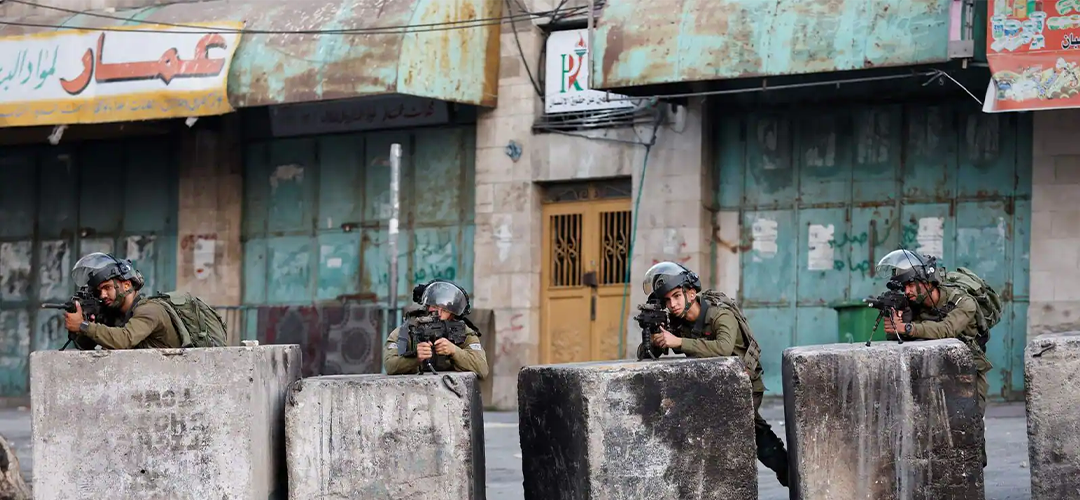NIGHTMARE ON GAZAN STREETS
August 20, 2022 | Expert Insights

The grisly cycle of violence was in evidence once again in the Palestinian administrated territories. It all began with the Israeli Defence Forces (IDF) launching precision air strikes to take out senior commanders, this time of Palestinian Islamic Jihad (PIJ). Predictably, PIJ launched hundreds of rockets into Southern and Central Israel, with the Israeli Iron Dome shooting down most of them. Israel followed up with more strikes, massing troops and closing the Gaza border, thus choking its lifeline. After three days of pounding, a truce was brokered by Egypt on August 7th.
The PIJ was formed in 1981 with two key objectives: the establishment of the Islamic state of Palestine and the destruction of the state of Israel. The militant organisation has been responsible for multiple terror attacks in Israel, such as the 2001 suicide bombing in a Tel Aviv nightclub that killed 21 Israelis. The PIJ is supported by Israel's arch-enemy Iran, which is the primary reason Israel wants the organisation wholly neutralised.
According to the Palestinian Health Ministry, the three-day conflict claimed the lives of 43 Palestinians, including 15 children, and injured more than 311 others. This makes the recent clashes the most violent outburst since the 11-day conflict between Israel and Hamas last year. And at the end of the day, both sides declared victory. Israel's PM Yair Lapid stated that "the military offensive in Gaza will continue as long as necessary". Iran's senior commanders have condemned and vowed revenge against Israel's attacks.
Background
The arrest of the senior-most PIJ leader, Bassam al-Saadi, was the primary catalyst for the escalation of violence. Saadi has significant influence in the Palestinian refugee camps in the West Bank. In the protests following Saadi’s arrest, a 17-year-old Palestinian youth was shot dead, sparking unrest in the West Bank and the Gaza Strip. Fearing a rise in tensions, the Israeli government blocked roads and stopped rail traffic near the Gaza border. The Egyptian government immediately held talks with Palestinian leaders in Gaza to prevent any escalation of violence.
The IDF asserted that it had concrete evidence that the PIJ had intended to launch anti-tank missiles at Israeli targets in the Gaza border areas as retaliation against Saadi's arrest. To pre-emptively deter these attacks, the IDF initiated Operation Breaking Dawn targeting high-ranking PIJ officials, members and weapons factories and launching pads in the Gaza Strip.
Analysis
Israel's pre-emptive strikes have been integral to its military strategy since the Six Day War in 1967. However, this strategy has only continued the cycle of violence rather than ending it. Despite multiple ceasefires, truces, peace talks and agreements through the years, stable peace remains a distant dream in the Israel-Palestine conflict.
Israel has continued to follow its principle of minimum loss and maximum impact during this conflict. On the offensive side, Israel has fulfilled all its objectives using only its airforce consisting of fighter jets and armed drones. On the defensive side, Israel's missile defence system, the Iron Dome, managed to intercept 97 per cent of the rockets fired into Israeli territory. The missiles that did manage to land within Israel did not cause any damage.
The Israeli retaliation for PIJ rocket launches was swift and heavy, destroying multiple civilian and militant infrastructures throughout the Gaza Strip. The impact of the counterattacks deterred Hamas, the foremost governing authority in Gaza, from entering the conflict.
Reportedly, the PIJ has lost most of its senior leaders and essential infrastructure in this conflict. The lack of leadership will cripple the planning and functioning of the organisation. Using nearly 1175 rockets to target Israel would have depleted a significant chunk of their arsenal. Moreover, since the PIJ did not operate alongside other Palestinian groups in Gaza, they would be solely held responsible for the fallouts of the conflict.
Meanwhile, the international community has been split, with the GCC countries condemning Israel's attacks and the U.S. and the West supporting Israel's right to defend itself against terrorist organisations like the PIJ.

Assessment
- The fragile truce may dissolve anytime since both sides are not interested in peace-building measures. It will only mean more misery, and worse bloodshed, to common citizens on the streets of Gaza and the West Bank. Sadly, Palestine is a wound that has bled for so long now that hardly anyone in the world gives it any notice.
- More than commenting on the conflict, countries like India, which share good relations with the Palestinians and the Israelis, could act as mediators to prevent any large-scale conflicts in the future. However, the role of the mediators would be restricted and challenging since both parties have been known for straying away from external counsel.
- Closer at home, the interim Israeli Prime Minister has more pressing issues to ponder; he must face the electorate again in the next three months. At the cost of Gaza, a successful military operation would not be a bad thing to boost popular ratings.








Comments